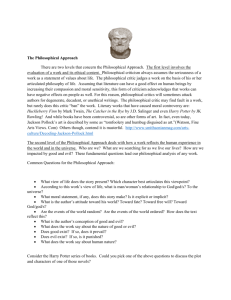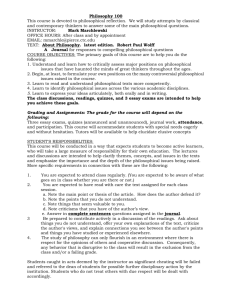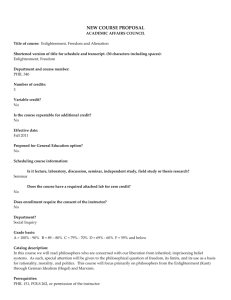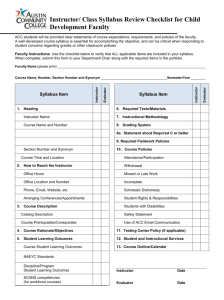Hawaii Pacific University
advertisement
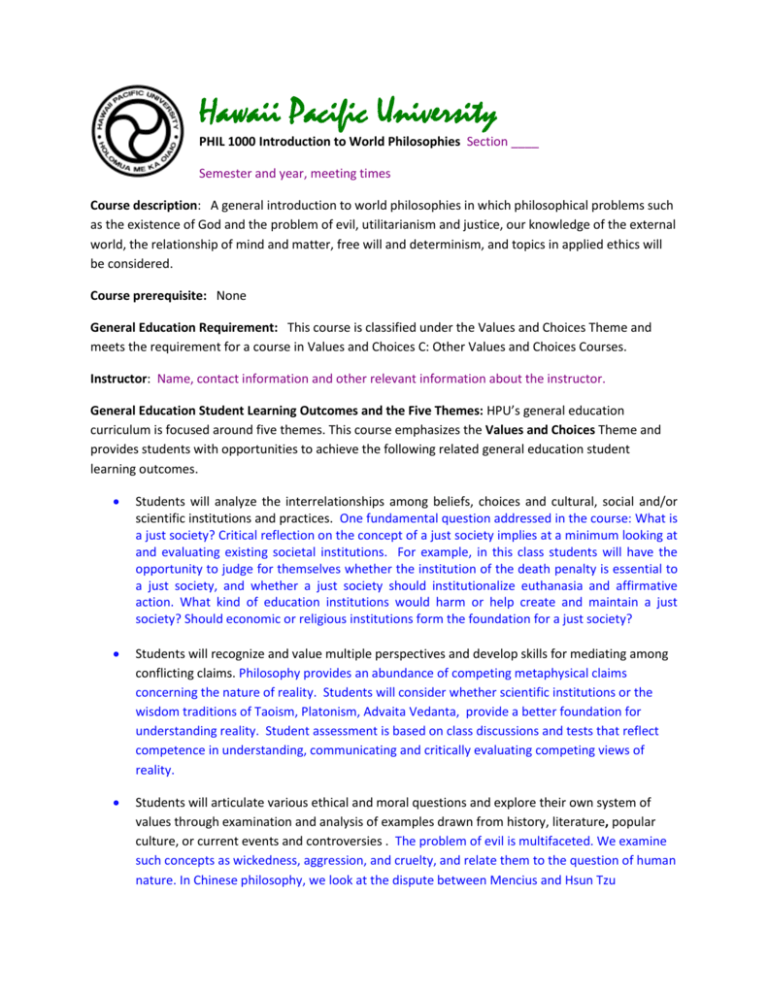
Hawaii Pacific University PHIL 1000 Introduction to World Philosophies Section ____ Semester and year, meeting times Course description: A general introduction to world philosophies in which philosophical problems such as the existence of God and the problem of evil, utilitarianism and justice, our knowledge of the external world, the relationship of mind and matter, free will and determinism, and topics in applied ethics will be considered. Course prerequisite: None General Education Requirement: This course is classified under the Values and Choices Theme and meets the requirement for a course in Values and Choices C: Other Values and Choices Courses. Instructor: Name, contact information and other relevant information about the instructor. General Education Student Learning Outcomes and the Five Themes: HPU’s general education curriculum is focused around five themes. This course emphasizes the Values and Choices Theme and provides students with opportunities to achieve the following related general education student learning outcomes. Students will analyze the interrelationships among beliefs, choices and cultural, social and/or scientific institutions and practices. One fundamental question addressed in the course: What is a just society? Critical reflection on the concept of a just society implies at a minimum looking at and evaluating existing societal institutions. For example, in this class students will have the opportunity to judge for themselves whether the institution of the death penalty is essential to a just society, and whether a just society should institutionalize euthanasia and affirmative action. What kind of education institutions would harm or help create and maintain a just society? Should economic or religious institutions form the foundation for a just society? Students will recognize and value multiple perspectives and develop skills for mediating among conflicting claims. Philosophy provides an abundance of competing metaphysical claims concerning the nature of reality. Students will consider whether scientific institutions or the wisdom traditions of Taoism, Platonism, Advaita Vedanta, provide a better foundation for understanding reality. Student assessment is based on class discussions and tests that reflect competence in understanding, communicating and critically evaluating competing views of reality. Students will articulate various ethical and moral questions and explore their own system of values through examination and analysis of examples drawn from history, literature, popular culture, or current events and controversies . The problem of evil is multifaceted. We examine such concepts as wickedness, aggression, and cruelty, and relate them to the question of human nature. In Chinese philosophy, we look at the dispute between Mencius and Hsun Tzu concerning the question “Are humans good or evil by nature?” From the Buddhist perspective, we consider the relationship between karma and evil. The African perspective provides an understanding of some of the sources of evil. And the question of meaning in relation to evil is explored in Fackenheim’s “Jewish Faith and the Holocaust: A Fragment.” Student assessment is based on exam questions. The course also addresses the Research and Epistemology Theme by providing students with opportunities to achieve the following related general education student learning outcome: Students will understand the concept of epistemology, i.e., that there are various systems of gathering/organizing/analyzing/evaluating in the process of constructing knowledge as well as multiple ways to solve a given problem. In this course we distinguish between sources of knowledge and modes of knowledge; it is the contrast between knowledge as discovery vs. knowledge as a human mental construct/model/representation. The comparative approach we adopt in order to explore epistemological issues takes into consideration a unique Afrocentric feminist perspective, Classical Indian theories of knowledge, mystical Sufism, and views found in the Classical Western philosophical traditions of Cartesian rationalism, Humean British empiricism and Jamesian Pragmatism. Student assessment is based on lecture, class discussion/participation and tests. Note: Purple text shows places where specific course information must be filled in. Red text provides explanatory notes to the instructor which should be deleted before using the syllabus. Blue explanations above should be rephrased by the individual instructor to reflect the specific approach in that section of the course. Course-specific outcomes below are an example and may also be rephrased or modified by the instructor. Course-Specific Student Learning Outcomes for PHIL 1000 Introduction to World Philosophies As a student in PHIL 1000 you will o o o o o read philosophical texts, in order to analyze their arguments and evaluate their answers to the questions of the course; become familiar with major philosophical problems and the methods of dealing them, acquire an initial command of philosophical language. Understand how philosophical concepts can help you understand practical dilemmas; and express your ideas through arguments--both verbal and written--which present your reasons for holding your beliefs. For the rest of these required syllabus items see the details in the faculty handbook. Delete this note once the syllabus is complete. For online courses there are some additional requirements given at this link. Please note that element 4 (relation of the course to the five themes) on the sample syllabus at the link is not needed on general education syllabi because it is covered under the “General Education Student Learning Outcomes and the Five Themes” section. Texts Assignments and mode of evaluation Summary of important dates and deadlines (if the schedule is a separate document and due dates are not given with the description of the assignments). Class rules and policies (including regarding attendance, late work and academic dishonesty) Schedule of events (may be attached separately)


